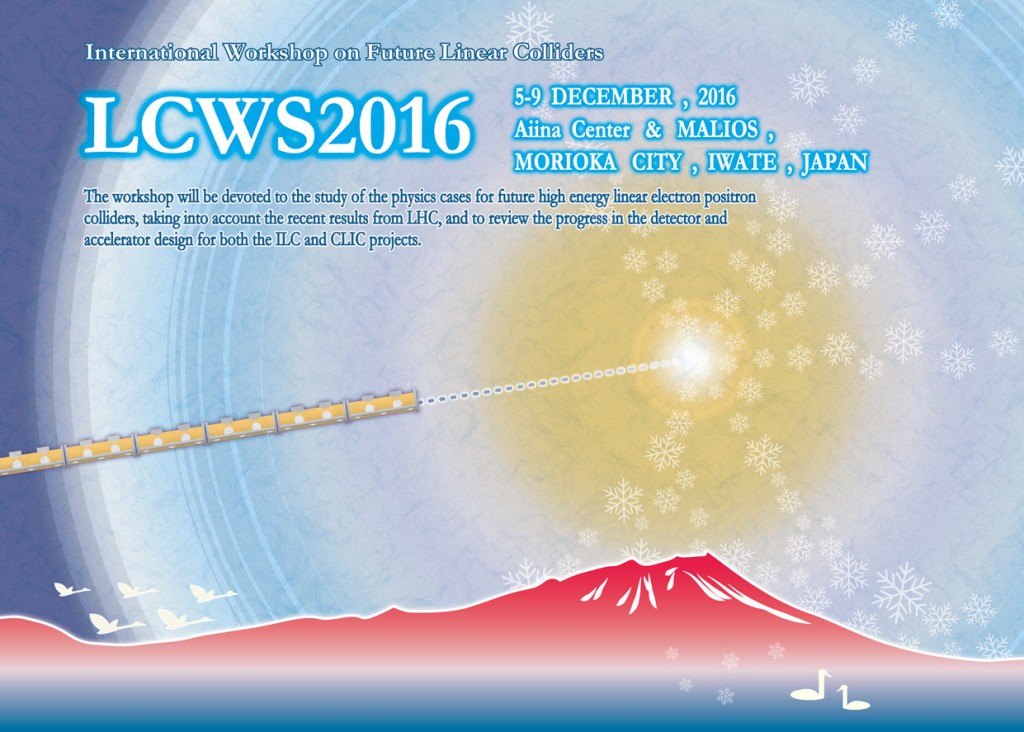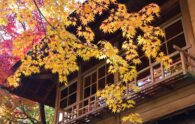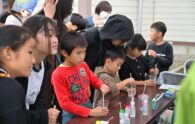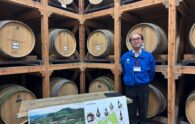「宇宙は絶えず われらによって変化する」
“The universe will continue, through us, changing.”
-Kenji Miyazawa, Iwate poet and author
Iwate, with its large amount of arable land, is known as one of the top food producers in Japan. While demographic shifts and population decline have brought huge challenges for Japanese primary industry, and indeed the whole country, there are still young people in Iwate who are going into agriculture. In central Iwate lies Hanamaki Agricultural High School, where students learn the common high school curriculum along with the basics of farming. Each student majors in a certain field of agriculture, from animal husbandry to vegetable farming.

Together in the orchard
In late September, as the leaves began turning gold and scarlet, I met with the students majoring in fruit production. These young people are actually working on a special project for the Linear Collider Workshop 2016: they’re growing special “ILC Apples,” to be given to researchers visiting for the conference in December. I spoke to them a bit about the ILC when we met, but for my part, I wanted to know the lowdown about these apples.
(To be quite honest, I probably learned more about growing apples than they did about particle physics!)
First things first. We drove up the dusty road to their campus in the hills of Hanamaki, passing by rice fields and the surrounding farms. I strapped on my boots and work clothes – today, I was prepared to get dirty. After meeting the students outside, we had a talk about the International Linear Collider.

Learning about the ILC
This was part of the ILC Caravan, which is a series of lectures in Iwate led by people involved with the ILC. We travel around with the Caravan to talk to various people about the project, with a focus on those who might not interact with physics or international relations on a daily basis. After all, those people are already very interested in the ILC. The ILC Caravan is being held to make the case that the ILC is truly a project that will involve everyone, from the Nobel Prize-winning scientist to the farmer tending the fields near the ILC facility.
After talking about what the ILC does, and how Iwate might change with an influx of new foreign residents, we marched out to the apple orchards to prepare the ILC Apples. The students had already wrapped the apples on the trees in newspaper, to block the sun’s light. Removing the paper revealed pale yellow apples, upon which we stuck clear seals with “ILC” written in black marker. While the sun will turn these apples red, the ILC letters will remain the lighter color. Together, we spent the next half hour unwrapping the apples and placing the stickers.

It’s sticker time!
The apples won’t be harvested for a few more weeks, after some tender love and care from the students. For my part, I was amazed with how much work goes into creating something I take for granted: the humble apple. I was also happy that the students seemed interested in learning more about the ILC. I just hope that they took away one fact: if the ILC is realized here, their lives will change. Even if they never take a step inside the ILC campus, their fruits will be bought by local researchers. Their neighborhoods will become more international. And their region will grow stronger and more vibrant. The ILC is truly something for everyone.

The Hanamaki Agricultural High School students with their prized apples
Incidentally, Hanamaki Agricultural High School is also known for one of its most famous teachers: a man named Kenji Miyazawa. Miyazawa was a writer, and philosopher, and teacher, and all-around Renaissance Man born in Iwate in the early 20th century. To Miyazawa, the rolling hills that now make up the ILC candidate site were a precious resource – all of Iwate, including the Kitakami mountains, was his personal “Ihatov”, which is an Esperanto word he coined that means both “Iwate” and “home.”
As you can see below, the poster for the LCWS 2016 takes its motif from Miyazawa’s classic tale, “Night on the Galactic Railroad,” where a boy takes a trip to the stars in a train that flies through the night sky. What awaited the boy was the question: what is true happiness? In a similar way, the following question awaits us with the International Linear Collider: how was the universe formed? And for participants of the LCWS 2016? ILC apples, fresh from Hanamaki, will await you in Morioka!
Japanese
リンゴってすごい!『ILCキャラバン』を
花巻農業高校で開催
【岩手県】 和山アマンダ
「宇宙は絶えず われらによって変化する」
-岩手の詩人・作家の宮沢賢治 著
田畑が広がる岩手は、食料自給率の高い県として知られています。日本における第一産業が、人口流出・人口減少による大きな課題に直面している中、岩手には農業を担う若者がいます。岩手の中央に位置する花巻農業高等学校では、生徒が高校の履修課程のほかに、農業の基礎を学んでいます。そして、畜産から野菜栽培まで、生徒一人一人が農業の分野を専攻します。
紅葉が始まる9月下旬、私は果樹を専攻している生徒に会いました。実は、この若い農業者らはLCWS2016のために特別な事業を企画しており、12月の国際会議で研究者たちに贈呈する「ILCリンゴ」を育てています。今回、私は少しILCを説明しましたが、それと同時に、ILCリンゴをどうやって作るかも知りたかったのです。
(正直に言うと、生徒が素粒子物理について学ぶよりも、私がリンゴづくりについて学びました)
当日は、車で土埃のある田園路を走り、花巻の小さな丘にある農業高校のキャンパスに向かいました。到着後、ブーツを履いて、作業着を着て、汚れても大丈夫な恰好に。まず、外で生徒に挨拶し、ILCの講座を始めました。実はこの講座は、ILCキャラバンの一環として開催されました。ILCキャラバンとは、ILCに関わる人たちが県内各地を回り、ILCへの理解を深めようとする取組です。普段からその分野に接点がある方々はすでにILCに興味があるため、私たちは日常生活で物理や国際交流とあまり接点がない方々を対象としてILCの話をしています。ILCキャラバンの目的は、ノーベル賞クラスの研究者からILCの周辺で畑仕事をする農家まで、「ILCは全ての人に関係する」ということを伝えることです。
ILCとは何か、外国人の居住によって岩手がどのように変貌するかについて話した後、ILCリンゴづくりをするため、全員でリンゴ畑へ向かいました。生徒たちは、リンゴを太陽の日差しから守るため、事前に新聞紙で木のリンゴを包んでいました。新聞紙を取り外し、薄い黄色のリンゴに、黒いマーカーで書かれたILCのクリアシールを貼ります。これから太陽がリンゴを赤くしますが、ILCの文字だけが薄い色で残ります。みんなで、30分ほどで新聞紙を取り外し、ILCのシールを貼る作業を行いました。
ILCリンゴの収穫まで数週間かかり、生徒たちが成長を見守ります。リンゴの栽培は当たり前に思っていましたが、実は難しいと感じました。また、生徒たちがILCについてより学ぼうと興味を持ってもらい嬉しく思いました。私が伝えたいメッセージは一つです。ILCがこの東北で実現すれば、皆さんの生活が変わります。たとえILCの研究施設に一歩も踏み入らなくても、研究者たちは生徒たちが栽培した果物を買います。生徒たちの近所が国際化します。そして、この地域が力強く成長し、発展していきます。ILCは、本当に皆さんに希望をもたらします。
ちなみに、花巻農業高校は、あの有名な宮沢賢治が教師として働いた場所です。宮沢賢治は、20世紀前半の岩手の作家、哲学者、教師、ルネサンス的教養人として知られています。ILC建設候補地となっている、岩手にとって大切な資源、緩やかな丘陵地帯の北上山地は、賢治にとって「イーハトーブ」でした。イーハトーブとは、賢治が作ったエスペラント語で、「岩手」、「故郷」という意味です。
実は、LCWS2016のポスターは、賢治の代表作の「銀河鉄道の夜」をモチーフにしたものです。その小説では、男の子が夜空を飛ぶ電車に乗って、宇宙を旅します。その旅の果てに、本当の幸せとは何か、という謎が待っていました。これと同じように、ILCの果てに、宇宙の成り立ちとは何か、という謎が待っています。そして、LCWS2016の参加者には何が待っているかというと…、学生ら手作りの花巻の新鮮なILCリンゴが待っています!




